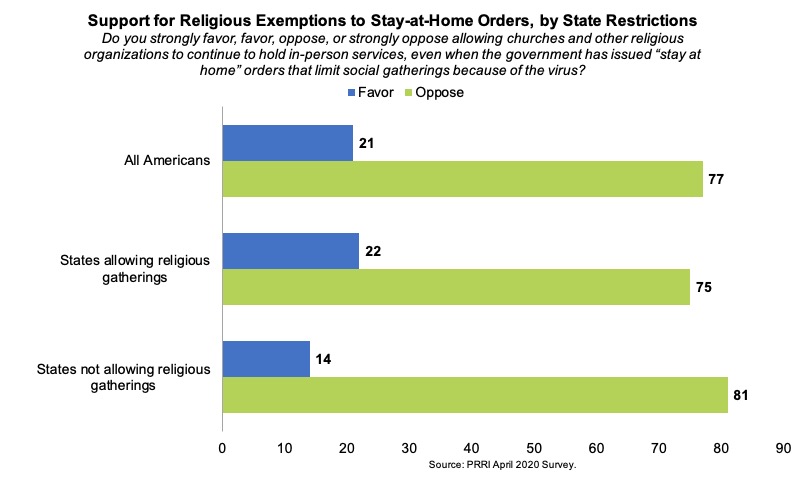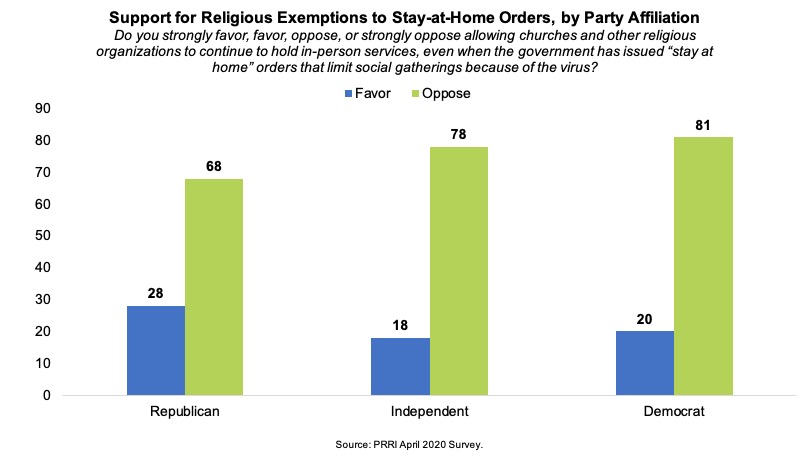On Friday in Washington, D.C., President Donald Trump put pressure on state governors to lift restrictions on church attendance, saying he would “override” them if they failed to do so. Trump added that the Center for Disease Control would issue new guidance on religious institutions and that “houses of worship, churches, synagogues and mosques” were “essential places that provide essential services.” PRRI data from April reveals what Americans think of holding in-person services while local stay-at-home orders are in effect elsewhere.
Only about one in five (21%) Americans favor allowing churches and religious organizations to hold in-person services even when the government has issued a stay-at-home order. More than three in four (77%) oppose such a religious exemption, including 40% who strongly oppose such a policy.

The Impact of Religious Affiliation, Party Affiliation, and Education
White evangelical Protestants (33%) are more likely than other religious Americans to favor allowing in-person religious gatherings. Fewer than one-quarter of nonwhite Protestants (25%), religiously unaffiliated Americans (18%), white Catholics (18%), and white mainline Protestants (15%) favor allowing in-person religious gatherings.
There is a slight partisan gap, with just over one in four Republicans (28%) saying they favor allowing in-person religious gatherings, compared to around one in five Democrats (20%) and independents (18%). More than two-thirds of Republicans (68%) compared to around eight in ten Democrats (81%) and independents (78%) oppose allowing religious groups to host in-person gatherings. The education gap persists among all Americans. More than one in five Americans with a high school degree or less (24%), or with some college (22%), compared to 16% of Americans with a four-year degree and 14% of Americans with a postgraduate degree, favor allowing in-person gatherings.
The education gap persists among all Americans. More than one in five Americans with a high school degree or less (24%), or with some college (22%), compared to 16% of Americans with a four-year degree and 14% of Americans with a postgraduate degree, favor allowing in-person gatherings.

The Fox News Effect
Americans who trust Fox News most to provide accurate information about politics and current events are around twice as likely as Americans who most trust any other news sources to say they favor allowing in-person religious gatherings (33% vs. 17%). [1]
There is a notable Fox News effect among Republicans, white Christians, and whites without a college degree. Nearly four in ten (39%) Republicans who trust Fox News most favor allowing in-person gatherings, compared to 19% of Republicans who trust another news source most. Among all white Christians, 35% of those who trust Fox News most favor allowing in-person gatherings, compared to 18% who most trust any other news source. Similarly, among whites without a college degree, 38% of those who trust Fox News most favor allowing in-person gatherings, compared to 18% who most trust any other news source.
[1]Americans are divided over whether they most trust local TV news (22%), Fox News (21%), CNN (20%), the major broadcast networks (20%), while fewer trust MSNBC (9%).





